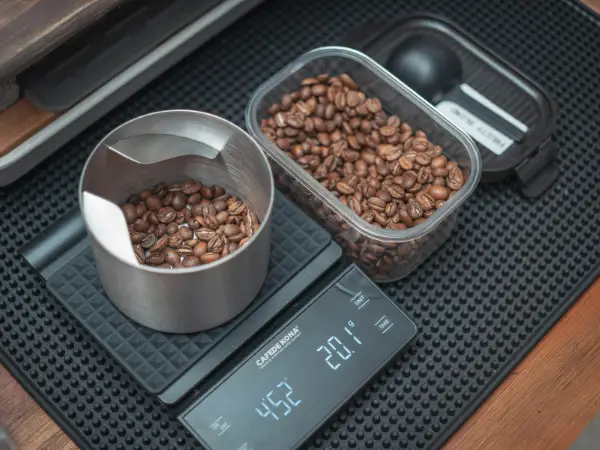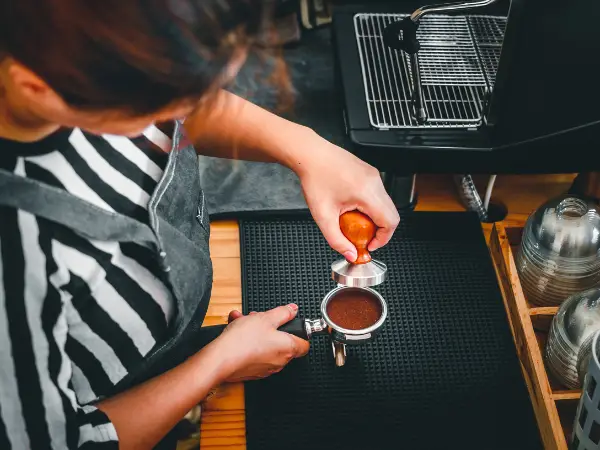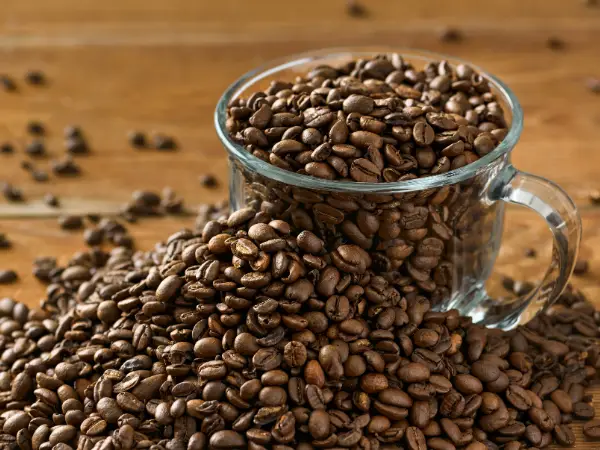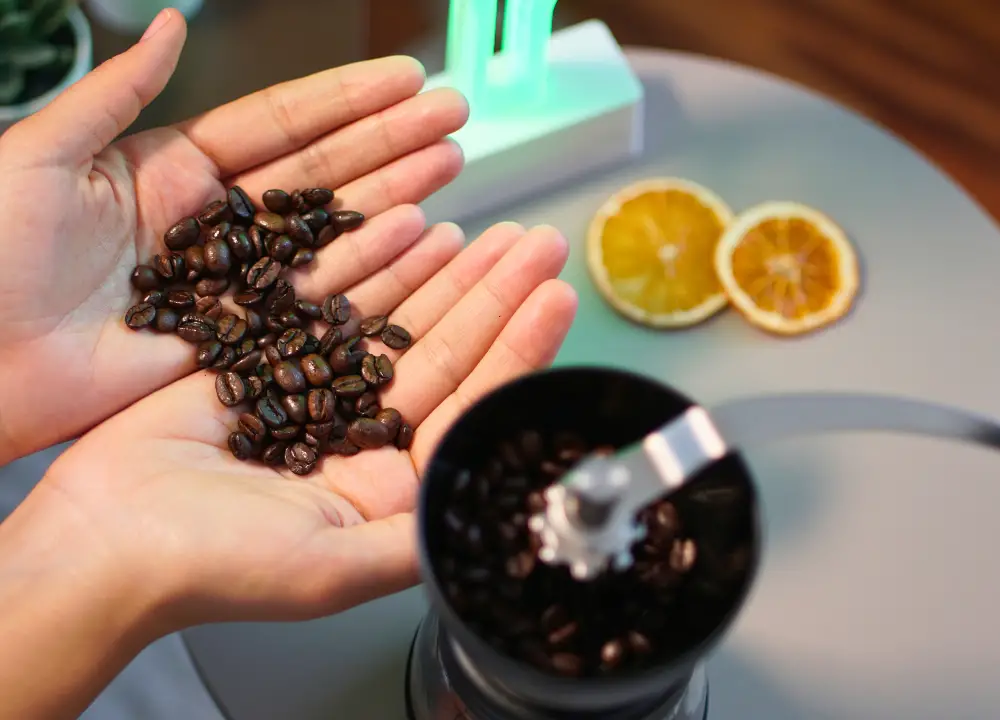In this guide, you will learn how many grams, tablespoons, and ounces to use for one cup of coffee. Understanding these measurements can improve your brewing skills.
Table of Contents
Understanding The Perfect Coffee-to-water Ratio
The right amount of coffee beans can make a big difference in your cup of coffee. Understanding the perfect coffee-to-water ratio helps create the best flavor and strength.
Why The Right Amount Of Coffee Beans Matters
The amount of coffee beans you use directly affects the taste and quality of your brew. Using too few beans can lead to a weak, watery coffee. On the other hand, using too many beans can create a bitter taste. Finding the right balance is key.
Here are some important points to consider:
- Strength of Coffee: More beans mean stronger coffee.
- Flavor Profile: Different beans bring out different flavors.
- Consistency: A set ratio helps you brew consistently great coffee.
Understanding the right measurements can enhance your coffee experience. Below is a simple table showing recommended amounts:
| Amount of Coffee | Water Amount | Ratio |
|---|---|---|
| 10 grams | 180 ml | 1:18 |
| 15 grams | 250 ml | 1:17 |
| 20 grams | 300 ml | 1:15 |

Adjusting The Ratio For Different Tastes: Mild, Medium, And Bold Brews
Your taste preference plays a big role in how much coffee you should use. Some people enjoy a mild cup, while others prefer bold flavors. Adjusting the coffee-to-water ratio is an easy way to cater to your taste.
Here’s a quick guide to help you:
- Mild Brew: Use less coffee. A ratio of 1:18 is great.
- Medium Brew: A balanced ratio of 1:15 works well.
- Bold Brew: Use more coffee. A ratio of 1:12 can bring out strong flavors.
Experimenting with these ratios can help you find your ideal taste. Start with the recommended amounts and adjust based on your preference. This simple method leads to better coffee enjoyment.
Grams Of Coffee Beans For A Single Cup
This section focuses on grams of coffee beans for a single cup. Knowing how much to use helps you brew the perfect cup every time.

Ideal Grams Coffee Beans Per Cup
The right amount of coffee beans for a perfect brew is important. Generally, experts recommend using around 10 grams of coffee beans per 6-oz (180 ml) cup. This measurement provides a balanced flavor without being too strong or too weak.
Factors that can affect your preference include:
- Bean type
- Roast level
- Brewing method
Here’s a simple table showing different coffee types and their ideal amounts:
| Coffee Type | Grams per 6-oz Cup |
|---|---|
| Light Roast | 10-12 grams |
| Medium Roast | 10 grams |
| Dark Roast | 8-10 grams |
Adjusting the amount of coffee beans can change your drink’s taste. Experimenting helps you find what you like best.

Grams Ground Coffee Per Cup
Using the right amount of ground coffee is crucial for a great cup. For every 6-oz (180 ml) cup, you should aim for 10 grams of ground coffee. This measurement allows for a consistent and enjoyable flavor.
Here are some tips for measuring ground coffee:
- Use a kitchen scale for accuracy.
- Consider the grind size. Finer grinds may require less coffee.
- Adjust based on taste preferences. Some may prefer stronger coffee.
To visualize, here’s how the ground coffee measurements compare:
| Measurement | Amount |
|---|---|
| Teaspoons | 2 teaspoons (approx.) |
| Tablespoons | 1 tablespoon (approx.) |
Measuring ground coffee accurately ensures the best flavor extraction. Keep these tips in mind for your next brew.
Tablespoons Of Whole Coffee Beans
Understanding tablespoons of whole coffee beans helps you brew a great cup. This guide will help you figure out the ideal amount of whole beans and ground coffee needed for your cup.

Tablespoons Whole Bean Per Cup
For a 6-oz (180 ml) cup, using whole coffee beans is simple. A common measurement is 2 level tablespoons of coffee beans. This amount offers a rich flavor and aroma. Here’s a quick breakdown of the measurement:
- 1 tablespoon = 5-6 grams of coffee beans
- 2 tablespoons = 10-12 grams of coffee beans
Many coffee enthusiasts prefer to adjust the amount based on their taste. Here’s a helpful table for reference:
| Measurement | Grams | Flavor Strength |
|---|---|---|
| 1 tablespoon | 5-6 grams | Light |
| 2 tablespoons | 10-12 grams | Medium |
| 3 tablespoons | 15-18 grams | Strong |
Start with 2 tablespoons for a balanced taste. Adjust it according to your preference. More beans lead to a stronger flavor, while fewer beans give a lighter taste.

Tablespoons Ground Coffee Per Cup
When using ground coffee, the measurement changes slightly. For a 6-oz (180 ml) cup, 1-2 tablespoons of ground coffee is a standard choice. This amount varies based on the grind size and personal taste.
Ground coffee has a different density compared to whole beans. Here’s a quick guide:
- 1 tablespoon of ground coffee = 5-7 grams
- 2 tablespoons of ground coffee = 10-14 grams
Refer to the table below for ground coffee measurements:
| Measurement | Grams | Flavor Strength |
|---|---|---|
| 1 tablespoon | 5-7 grams | Light |
| 2 tablespoons | 10-14 grams | Medium |
| 3 tablespoons | 15-21 grams | Strong |
Experimenting with these measurements can lead to your perfect cup. Start with 1-2 tablespoons and adjust based on your preference.
Ounces Of Coffee Beans For Brewing Precision
This section covers the right amount of whole beans and ground coffee in ounces for brewing precision.
Ounces Whole Bean Per Cup
For whole coffee beans, the general guideline is to use about 0.5 to 0.6 ounces per 6-oz (180 ml) cup. This ensures a balanced flavor without being too strong or too weak. Here’s a quick breakdown:
- 0.5 ounces (about 14 grams) for a lighter taste.
- 0.6 ounces (about 17 grams) for a standard cup.
- 0.7 ounces (about 20 grams) for a stronger brew.
Using a kitchen scale is the best way to measure whole beans accurately. Grinding them right before brewing helps to maintain freshness. Here’s a simple table to summarize:
| Strength | Ounces | Grams |
|---|---|---|
| Lighter | 0.5 oz | 14 g |
| Standard | 0.6 oz | 17 g |
| Stronger | 0.7 oz | 20 g |
Adjust the amount based on personal preference. Experiment with different amounts to find the taste you enjoy the most.

Ounces Ground Coffee Per Cup
For ground coffee, the recommendation is slightly different. Use about 0.4 to 0.5 ounces per 6-oz (180 ml) cup. This range provides a good balance of flavor and strength. Here are some key points:
- 0.4 ounces (about 11 grams) for a milder cup.
- 0.5 ounces (about 14 grams) for a balanced flavor.
- 0.6 ounces (about 17 grams) for a bolder taste.
Grinding coffee too fine can make it bitter. Coarse grind is better for a lighter flavor. Here’s a quick table to help:
| Strength | Ounces | Grams |
|---|---|---|
| Milder | 0.4 oz | 11 g |
| Balanced | 0.5 oz | 14 g |
| Bolder | 0.6 oz | 17 g |
Try different grinds and measurements to discover your perfect cup. Remember, brewing coffee should be an enjoyable experience.

Tailoring Your Brew Strength
Tailoring your brew strength helps achieve the perfect balance. Adjusting the amount can create a coffee that fits your mood.
Crafting A Mild Coffee: Fewer Beans, Softer Flavor
Mild coffee offers a gentle taste. It is perfect for those who enjoy a subtle flavor. Using fewer beans is the main trick. The recommended amount is:
| Measurement | Amount of Beans |
|---|---|
| Grams | 10-12 grams |
| Tablespoons | 1.5-2 tablespoons |
| Ounces | 0.35-0.42 ounces |
Using fewer beans leads to a softer flavor. Here are some tips:
- Choose a light roast coffee.
- Grind the beans coarsely.
- Use filtered water for a cleaner taste.
- Steep for a shorter time, about 3-4 minutes.
This method creates a smooth cup. It’s enjoyable for sipping throughout the day. Experiment with different beans to find your favorite mild flavor.
Going Bold: More Coffee Beans For A Bitter Kick
For those who like a stronger brew, using more coffee beans is essential. A bolder taste can be energizing and satisfying. The recommended amount for a robust cup is:
| Measurement | Amount of Beans |
|---|---|
| Grams | 15-20 grams |
| Tablespoons | 2.5-4 tablespoons |
| Ounces | 0.53-0.71 ounces |
Using more beans gives a richer flavor. Here are ways to enhance your bold brew:
- Select a dark roast coffee.
- Grind the beans finely for maximum extraction.
- Use water at a higher temperature, around 200°F (93°C).
- Steep for a longer time, about 5-6 minutes.
This method produces a stronger and more bitter coffee. It’s great for those who enjoy a kick in their cup. Adjusting the bean amount lets you create your perfect brew.
Tips For Consistently Great Coffee
Understanding how to measure coffee beans and store them properly is key.
How To Measure Coffee Beans Without A Scale
Measuring coffee beans can seem tricky without a scale. But you can achieve accuracy using common kitchen tools. Here are a few methods:
- Tablespoon Method: One tablespoon of coffee beans typically weighs about 7-8 grams. Use this for quick measurements.
- Standard Coffee Scoop: A coffee scoop usually holds about 10 grams of coffee beans. This is handy for consistent brewing.
- Visual Estimation: One heaping tablespoon is roughly equal to 10 grams. This is useful if you don’t have other tools.
For a more precise approach, consider the following table:
| Measurement | Weight (grams) | Weight (ounces) |
|---|---|---|
| 1 tablespoon | 7-8 grams | 0.25-0.28 ounces |
| 1 coffee scoop | 10 grams | 0.35 ounces |
| 1 heaping tablespoon | 10 grams | 0.35 ounces |
With these methods, you can measure coffee beans accurately. This helps ensure each cup is delicious.

Storing Coffee Beans For Maximum Freshness
Storing coffee beans properly is essential for keeping them fresh. Exposure to air, light, and moisture can ruin their flavor. Follow these tips to maintain freshness:
- Airtight Containers: Use airtight jars or containers. This prevents air from degrading the beans.
- Cool, Dark Places: Keep coffee beans in a cool, dark spot. Avoid heat sources like stoves or sunlight.
- Whole Beans vs. Ground: Always store whole beans instead of ground coffee. Ground coffee loses freshness quickly.
Here are some storage options:
| Container Type | Pros | Cons |
|---|---|---|
| Airtight glass jar | Looks nice, prevents air exposure | Can break if dropped |
| Vacuum-sealed bags | Highly effective, portable | Less convenient for daily use |
| Opaque tin | Protects from light, durable | Can be less airtight |
By following these storage tips, you can keep your coffee beans fresh. Fresh beans make for better coffee.

